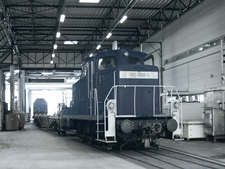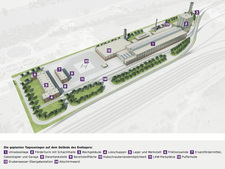Transports to the Konrad repository
Up until now, there is no operable and licensed repository for radioactive waste available in Germany. Already today, however, waste has been stored in decentralised interim storage facilities. Responsibility for transports to the Konrad repository required in future is with the waste producers. The transports will be licensed by the Federal Railway Authority or, respectively, by the competent Länder authorities which also supervise the transports.

![]() It is expected that 20 freight wagons will arrive at the repository site every week.
It is expected that 20 freight wagons will arrive at the repository site every week.
For the Federal Office for Radiation Protection (BfS) it is natural to examine possible risks emanating from the transports of radioactive waste to the Konrad repository and to have as much knowledge of them as possible – irrespective of the fact that the BfS does neither carry out nor license the transports.
Not only does the general public critically question the disposal of the radioactive waste in Konrad, also the transport of the waste by rail and lorry to Salzgitter is a cause of great concern. However, neither transport route nor the volume of traffic and the waste management should become a matter of concern. Transports may only be licensed and executed once it has been ensured that all measures have been taken that are required to protect the population and the environment.
The Gesellschaft für Anlagen- und Reaktorsicherheit (GRS) mbH has been tasked with examining the consequences of transports in more detail. With the "Konrad Transport Study" it has
- determined the radiation exposure to the public and the transport staff associated with accident-free delivery of the waste and
- estimated and evaluated the transport accident risk in the siting region of the repository associated with the delivery of the waste, assessing the frequency and consequences of such an accident to be expected.
The study comes to the conclusion that the transports do not pose any relevant radiological risk to man and environment.
No separate security of transports required
Neither is a separate shielding of the waste containers or security of transports required, since the waste may only be transported in officially approved and radiologically safe containers. These containers have been constructed in such a manner that man and environment are not exposed to impermissible radiation levels, even in the event of an accident. Altogether, the safety of the waste transports is guaranteed by compliance with the transport provisions with regard to dangerous goods regulations and radiation protection requirements.
Waste producers responsible for transports
The waste producers, e.g. the nuclear power plant operators or the nuclear industry, are responsible for the transport of the waste packages to the repository. They use an authorised entrepreneur. The entrepreneur must furnish evidence of reliability and expertise to the competent authorities and appoint a safety adviser. Only then may he or his enterprise be commissioned with the respective transport.
Furthermore, all transports are subject to special regulations and are marked by signposting as dangerous goods and "Radioactive". Drivers need a special training for the transport of hazardous goods of "class 7" (radioactive materials).
Licensing and supervision
As opposed to the transports of nuclear fuels that are licensed by the Federal Office for the Safety of Nuclear Waste Management (BfE), the approval of transports of waste with negligible heat generation depends on the modes of transport chosen by the waste producers:
- Is the waste delivered by rail, the transport needs to be approved by the Federal Railway Authority.
- Transport by road is licensed by the competent authorities of the individual Länder.
Transport by other modes of transport is not provided for. The transports are supervised by the Länder authorities.
Beddingen transfer station
The railway-cars carrying the waste packages are delivered to Beddingen freight terminal. From there they are transported to the premises of the Konrad repository and into the reloading hall – the place where also the waste is accepted that has been transported on lorries.
Incoming inspection of the waste

![]() Surface facilities at Konrad Shaft 2
Surface facilities at Konrad Shaft 2
Once the waste has arrived on the Konrad premises, it has to undergo an incoming inspection consisting of several steps. For this purpose, the containers are lifted with a crane from the railway-car or the lorry in the reloading hall and placed on a platform lorry designed for transport inside the mine. The platform lorry takes the waste to the radiation measuring station. Only after a waste package has positively passed the incoming inspection, may it be accepted for disposal.
During the operational phase, the BfS as the repository operator is responsible for the internal transport and handling of the waste.
State of 2017.03.15

